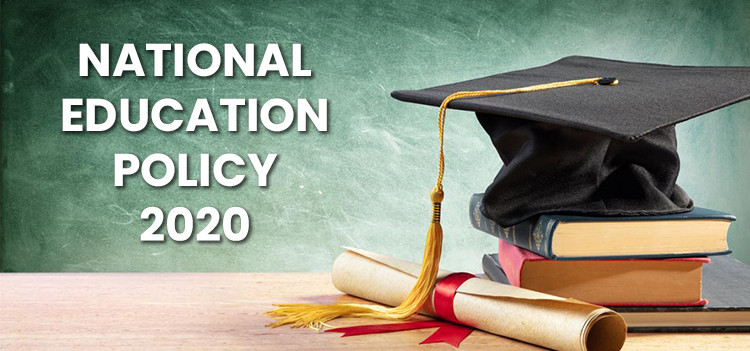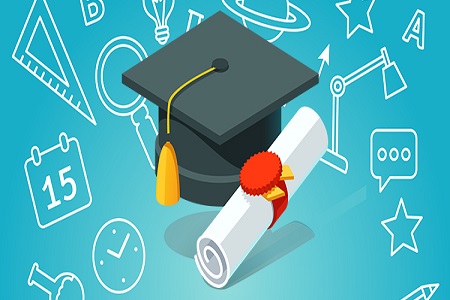The National Educational Policy 2020 was implemented for complete transformation of the Indian Education System. The new National Education Policy 2020 (NEP) revealed by the central government, seeks to introduce and implement a sea of changes across all levels of education in India. The NEP also seeks to implement changes in the way that facilitators of such education- schools, colleges and teachers are trained and how they approach education.
The NEP 2020 policy aims to reform the complete Indian Education System according to the latest international standards and also tries to seek a change in the landscape of Indian Learning.
The Union Ministry of Education has come up with a booklet further with many reforms beside the implementation of National Education Policy 2020. The NEP 2020 Booklet provides some crucial elements that were implemented under one-year of NEP Policy that has further enhanced the seamless implementation of NEP 2020 across the country.
Reforms taken under NEP 2020
SARTHAQ
SARTHAQ: Students’ and Teachers’ Holistic Advancement through Quality Education
SARTHAQ initiative has been formulated through an intensive consultative process with states and UTs, Autonomous bodies, and suggestions received from all stakeholders. Under SARTHAQ a detailed plan is framed where it gives detailed activities, strategies, tasks and timelines for the hassle-free implementation of the NEP 2020. The implementation of SARTHAQ envisioned that it helps more than 25 crore students, 15 lakh schools, 94 lakhs teachers, educational administrators, parents, and the community with education.
Samagra Shiksha
Under the “Samagra Shiksha” scheme The Department of School Education & Literacy implements an Integrated centrally sponsored scheme for School Education. The main objective of “Samagra Shiksha” is to improve the quality of school education across all levels. The “Samagra Shiksha” scheme is in accordance with Sustainable Development Goal for Education and has now been aligned with the National Education Policy (NEP) 2020
Recommendations of NEP 2020 under “Samagra Shiksha” are:
- Provide foundational Literacy and Numeracy
- Implementation of Holistic Progress Card (HPC)
- Implementation of tracking mechanisms for learning outcomes as well as the transition of children
- Training for development of qualified counsellors at the schools
- Hire and train language teachers for non-Hindi speaking states
- Framework of activities for capacity building activities of teachers
- Implement Bagless days and internships for students
- Provide support for OOSC in the age group of 16- 19 years
- Provide provision for activities of PARAKH
- Provide separate stipend for CWSN girl child
- Perform annual identification activities of CWSN and Resource Centre at the panchayat levels
- Expand the schooling facilities including Residential Hostels, KGBVs,
- Provide a platform for spoke model in vocational education
- Develop Smart classrooms in schools to support “DIKSHA” schemes
- Provide support for Assessment Cells in SCERT
National Initiative for Proficiency in Reading with Understanding and Numeracy (NIPUN Bharat)
The launched a National Initiative for Proficiency in Reading with Understanding and Numeracy (NIPUN Bharat) under NEP 2020. The “NIPUN Bharat” is implemented to ensure that every child necessarily attains foundational literacy and numeracy by the end of Grade 3 or class 3rd. The main focus of “NIPUN Bharat” is to provide access and retain the children in foundational years of schooling and tracking the progress of each child in achieving learning outcomes.
Benefits of NIPUN Bharat
- Reduces the dropouts and improve the transition rate
- Activity-based learning and conducive learning environment to develop interest for the students
- Innovative Pedagogies and Experiential Learning to increase engagement in children
- Training the teachers through intensive capacity building
- Holistic development of the child by focusing on different domains
Vidya Pravesh
The main intent of this “Vidya Pradesh” scheme is to expose the children to a warm and welcoming environment when they enter Grade 1 or Class 1. Under the “Vidya Pravesh” scheme the children are familiarised with the school routine, help them learn necessary concepts, and acquire requisite foundational skills related to health, wellbeing, language literacy, mathematical thinking, and environmental awareness.
Benefits of Vidya Pravesh
- Under the “Vidya Pravesh” scheme The learning opportunities are framed to familiarise children with the school environment. and
- The children are also provide experiences for maintaining wellbeing through practicing health, nutrition, hygienic, and safety protocols; socio-emotional development; building the foundations of mathematics, language, and literacy;
- The children will given with direct experience of interaction with the physical, social and natural environment
Implementation of Joyful learning in Schools
Under these reforms the children will be given activity-based learning modules. The introduction of toycathons and hackathons for the children to develop their intelligence and intellectual knowledge with joy.
The children will be learning the concepts using toys according to their grades. This helps the children to develop creativity at a very young age.
NISHTHA
NISHTHA: National Initiative for School Heads and Teachers’ Holistic Advancements
The NISHTHA is an integrated training programme where the training is given to school heads and teachers under “Samagra Shiksha” initiative. There are 18 modules under NISHTHA programme such as,
- The primers; a training package with QR-coded e-content,
- Educational Videos, and other e-resources.
- Multiple approaches for interaction Text Modules along with videos,
- Live Sessions by National level Resource persons on DTH Swayam Prabha TV Channel
- Interactive Voice Response System.
National Digital Education Architecture (NDEAR)
The “NDEAR” will ensure that the technology-based solutions for the rapid advances in technology. The “NDEAR” is a unifying National Digital infrastructure to energise and catalyse the education ecosystem. The idea of NDEAR is to facilitate achieving the goals, through a digital infrastructure for innovations in the education ecosystem with autonomy.
DIKSHA
The DIKSHA is a platform for teacher development programmes for all the teachers across the country.
Teachers will be trained on the following under DIKSHA:
- Energised textbooks (QR coded and each QR code tagged with e-content) of NCERT and of states/UTs
- Audios/videos curated by expert teachers and mapped to curriculum
- Teacher Training modules by NCERT – NISHTHA
- Teacher training modules by states/UTs
- Introduction to Chatbot - WhatsApp, App, and web-enabled Chatbot launched
- The Bot helps a visitor to DIKSHA easily navigate to the required place.
- Vidyadaan or crowdsourcing of e-content on DIKSHA
- Radio and TV coherence - the same e-content that is available on one digital platform is being made available on other digital platforms too.
- Integrated Voice Response System: IVRS system
Swayam Prabha TV channel
The scheme is formulated Under the Atma Nirbhar Bharat initiative PM E-Vidya. The government launched 12 TV channels of SWAYAM PRABHA for classes 1-12. The content for these channels is mostly prepared in-house by the NCERT in its own production studios.
Shiksha Vani
The scheme is implemented Under the Atma Nirbhar Bharat initiative PM E-Vidya. Under The DIKSHA platform the teaching modules are aired through All India Radio across all the schools of India. The “Shiksha Vani” provides access anytime anywhere to learning resources. These resources will be developed by NCERT and SCERTs with the help of their teachers. The E-content is available as textbooks, audios, videos, item banks, teacher training modules, lesson plans, Learning Outcomes mapped to content, teacher handbooks.
E-Content in regional languages
The E-Content of all the classes and subjects will be made available for the students under “DIKSHA” scheme. The students can access all the E-learning materials like courses, notes, and handbooks in the regional languages.
Removing barriers between Academic and Vocational Subjects and Introduction of New Subjects
The CBSE has constituted a committee consisting of Educationists and practicing Principles from the various parts of the country decoding the recommendation of NEP regarding No Hard Separation between subjects and its implementation in schools.
- The CBSE has introduced Coding for students of classes VI-VIII and Data Science for students of classes VIII-XII. CBSE in collaboration with Intel
- The coding platform will be available in 11 different vernacular languages for anyone with digital access and compatible with various talkback applications used by visually impaired people
- The CBSC under DIKSHA scheme broadens the perspective towards possibilities, limitations, and concerns
| Sl No | Subjects |
|---|---|
| 1. | Artificial Intelligence |
| 2. | Beauty & Wellness |
| 3. | Design Thinking |
| 4. | Financial Literacy |
| 5. | Handicrafts |
| 6. | Information Technology |
| 7. | Marketing/Commercial Application |
| 8. | Mass Media |
| 9. | Travel & Tourism |
| 10. | Coding (New) |
| 11. | Data Science |
Conclusion
The NEP 2020 recommends an array of the reforms in the education sector. The initiatives have been successful till now and this ensures that there is complete reformation in the Indian education system.
Future Initiatives for NEP 2020
- Vidyanjali 2.0
- Talking Books: To develop Inclusive Education Resources
- SQAA - Standards for excellence in school education
- Development of NCFs and SCFs
- NPST - National Professional Standards for Teachers
- Education for All and Lifelong Learning
- 4 Year Integrated Teacher Education Programme
- National Mission for Mentoring (NMM)
- Entrepreneurship
- Guideline on School Safety and Security
- Guidelines for Gifted Students
We will come up with new blogs when the above initiatives are implemented by the Government.




